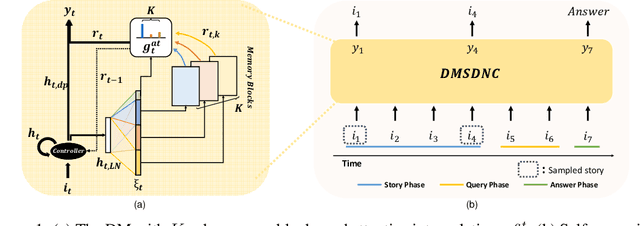Inchul Choi
Attention-based Iterative Decomposition for Tensor Product Representation
Jun 03, 2024



Abstract:In recent research, Tensor Product Representation (TPR) is applied for the systematic generalization task of deep neural networks by learning the compositional structure of data. However, such prior works show limited performance in discovering and representing the symbolic structure from unseen test data because their decomposition to the structural representations was incomplete. In this work, we propose an Attention-based Iterative Decomposition (AID) module designed to enhance the decomposition operations for the structured representations encoded from the sequential input data with TPR. Our AID can be easily adapted to any TPR-based model and provides enhanced systematic decomposition through a competitive attention mechanism between input features and structured representations. In our experiments, AID shows effectiveness by significantly improving the performance of TPR-based prior works on the series of systematic generalization tasks. Moreover, in the quantitative and qualitative evaluations, AID produces more compositional and well-bound structural representations than other works.
Meta-Learned Invariant Risk Minimization
Mar 24, 2021



Abstract:Empirical Risk Minimization (ERM) based machine learning algorithms have suffered from weak generalization performance on data obtained from out-of-distribution (OOD). To address this problem, Invariant Risk Minimization (IRM) objective was suggested to find invariant optimal predictor which is less affected by the changes in data distribution. However, even with such progress, IRMv1, the practical formulation of IRM, still shows performance degradation when there are not enough training data, and even fails to generalize to OOD, if the number of spurious correlations is larger than the number of environments. In this paper, to address such problems, we propose a novel meta-learning based approach for IRM. In this method, we do not assume the linearity of classifier for the ease of optimization, and solve ideal bi-level IRM objective with Model-Agnostic Meta-Learning (MAML) framework. Our method is more robust to the data with spurious correlations and can provide an invariant optimal classifier even when data from each distribution are scarce. In experiments, we demonstrate that our algorithm not only has better OOD generalization performance than IRMv1 and all IRM variants, but also addresses the weakness of IRMv1 with improved stability.
Distributed Memory based Self-Supervised Differentiable Neural Computer
Jul 21, 2020



Abstract:A differentiable neural computer (DNC) is a memory augmented neural network devised to solve a wide range of algorithmic and question answering tasks and it showed promising performance in a variety of domains. However, its single memory-based operations are not enough to store and retrieve diverse informative representations existing in many tasks. Furthermore, DNC does not explicitly consider the memorization itself as a target objective, which inevitably leads to a very slow learning speed of the model. To address those issues, we propose a novel distributed memory-based self-supervised DNC architecture for enhanced memory augmented neural network performance. We introduce (i) a multiple distributed memory block mechanism that stores information independently to each memory block and uses stored information in a cooperative way for diverse representation and (ii) a self-supervised memory loss term which ensures how well a given input is written to the memory. Our experiments on algorithmic and question answering tasks show that the proposed model outperforms all other variations of DNC in a large margin, and also matches the performance of other state-of-the-art memory-based network models.
Multi-Scale Generalized Plane Match for Optical Flow
Apr 11, 2018



Abstract:Despite recent advances, estimating optical flow remains a challenging problem in the presence of illumination change, large occlusions or fast movement. In this paper, we propose a novel optical flow estimation framework which can provide accurate dense correspondence and occlusion localization through a multi-scale generalized plane matching approach. In our method, we regard the scene as a collection of planes at multiple scales, and for each such plane, compensate motion in consensus to improve match quality. We estimate the square patch plane distortion using a robust plane model detection method and iteratively apply a plane matching scheme within a multi-scale framework. During the flow estimation process, our enhanced plane matching method also clearly localizes the occluded regions. In experiments on MPI-Sintel datasets, our method robustly estimated optical flow from given noisy correspondences, and also revealed the occluded regions accurately. Compared to other state-of-the-art optical flow methods, our method shows accurate occlusion localization, comparable optical flow quality, and better thin object detection.
 Add to Chrome
Add to Chrome Add to Firefox
Add to Firefox Add to Edge
Add to Edge